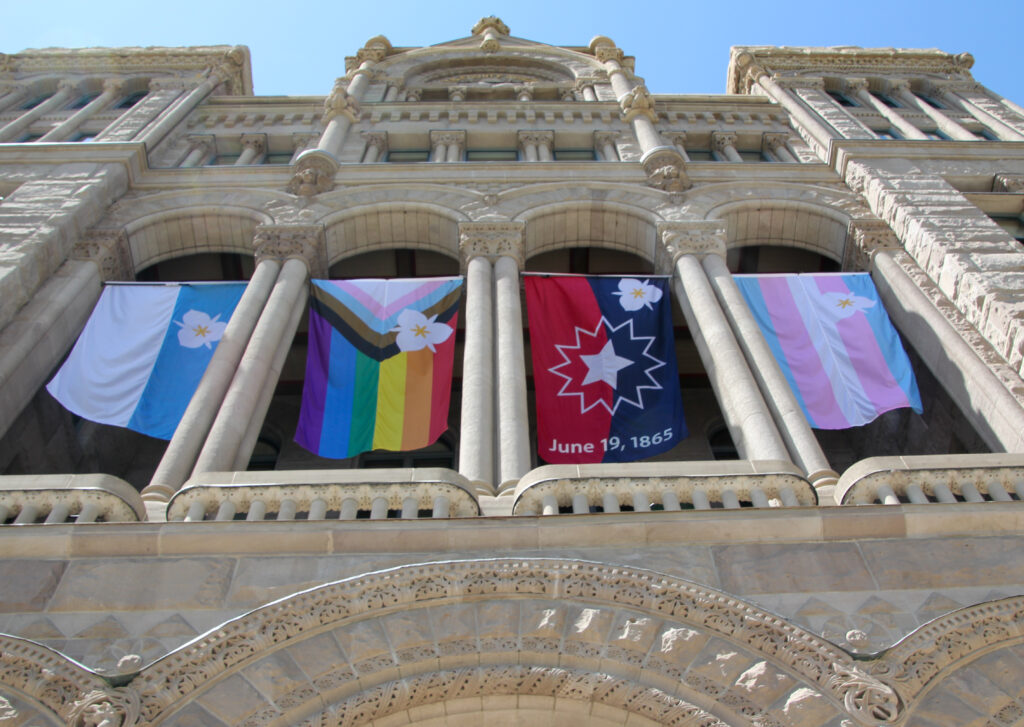Flags adopted as official banners of Salt Lake City, circumventing the state’s ban on most flags being displayed at government buildings and schools, hang outside the Salt Lake City and County building on Wednesday, May 7, 2025. The official city flags include the Salt Lake City flag, pride flag, Juneteenth flag and transgender flag. (McKenzie Romero/Utah News Dispatch)
“Dumb.”
That was the word Utah Gov. Spencer Cox used Tuesday to express his annoyance with a new law that bans certain flags in schools and government buildings while also criticizing Salt Lake City leaders’ move to circumvent the ban by adopting pride and other flags symbolizing diversity and inclusion as official city banners.
“They’re dumb flags and it was a dumb bill,” Cox said curtly when asked during his monthly PBS Utah news conference about Salt Lake City’s response to the flag ban.
Last month, hours before the new flag ban law took effect in Utah, Salt Lake City Mayor Erin Mendenhall unveiled a proposal to adopt three new city flags: a rainbow one symbolizing support for LGBTQ+ communities, a pink and white one for transgender people, and a red and blue one emulating the Juneteenth flag — all with Salt Lake City’s official white sego lily symbol. That evening, the City Council voted unanimously to adopt the flags.
Cox allowed HB77, the bill Utah lawmakers passed aimed at banning many flags — including pride or LGBTQ+ flags — from schools and all government buildings to become law without his signature. The bill made Utah the first state in the nation to enact such a sweeping flag ban.
Though he let it become law, Cox wasn’t a fan of HB77. He described it in a letter as “one of the most divisive bills of the session” and lamented that it didn’t result in a compromise.
Supporters of the flag ban, sponsored by Rep. Trevor Lee, R-Layton, have argued it was meant to promote “political neutrality” in government spaces. But critics argued the broad ban would invite free speech litigation while also leaving some Utahns, especially the LGBTQ+ community, feeling unwelcome and erased.
Cox could have vetoed the bill, but he indicated in his letter that it would likely have been overridden by the Republican-supermajority Utah Legislature. Instead, he urged lawmakers to “consider commonsense solutions that address the bill’s numerous flaws.” While Cox said he agreed with the “underlying intent” to bring “political neutrality to the classroom,” he also wrote “unfortunately, this bill does not do that.”
“As tired as Utahns are of politically divisive symbols, I think they are also tired of culture war bills that don’t solve the problems they intend to fix,” Cox wrote in his letter.
On Tuesday, Cox called the ongoing debate over the flag ban and Salt Lake City leaders’ response “ridiculous.”
“You know, I feel bad for Japanese Americans. I feel bad for Polynesian Americans. I mean, who are we leaving out, here?” Cox said of Salt Lake City’s new banners. “I’m sure they feel great that they got around this dumb law, and they did it with dumb flags. The whole thing’s dumb.”
Pressed on what he thinks should be done instead, Cox said, “We should raise the American flag, and let’s unify around that. It’s a great flag. It represents everyone. And the Legislature doesn’t need to be in everybody’s business all the time.”
Cox let out an exasperated laugh before adding: “we’re living in the dumbest timeline right now. That’s all I can say.”
In response to a request for comment on Tuesday, a spokesperson for the Salt Lake City Mayor’s Office said “we’ve had an overwhelmingly positive response” from Salt Lake City residents for the newly adopted city banners.
Lee, in a post on X responding to Cox’s comments on Tuesday, wrote: “So the bill to stop the divide and get everyone to raise one flag… was dumb?”
SUPPORT: YOU MAKE OUR WORK POSSIBLE
Read the full article here


